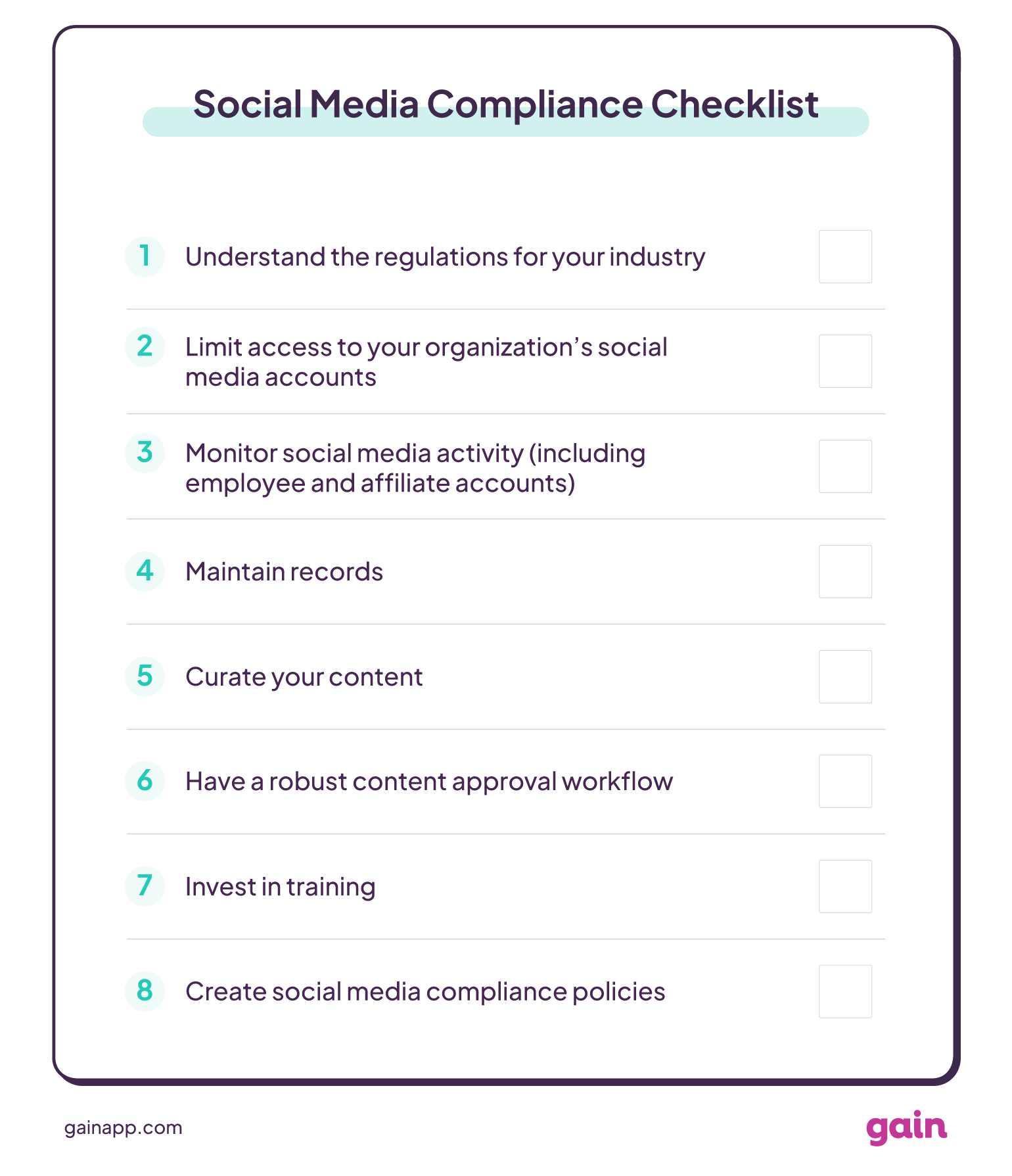Photo by Andrew Neel on Unsplash
As more than 4 billion people are active on social media, organizations are using it to connect with their audience and build their brands. However, with great power comes great responsibility, and social media compliance is a critical aspect that can’t be ignored.
Despite its significance, many marketing professionals tend to shy away from it, possibly due to social media regulations’ complexity and ever-changing nature. But fear not, as this simple guide to social media compliance is here to demystify the topic and equip you with the knowledge you need to stay on top of your social media game.
In this article, we’ll not only define social media compliance but also delve into the most common issues businesses face in this area. So, whether you’re a seasoned marketer or a newbie, let’s dive in and explore the ins and outs of social media compliance.
Four Common Social Media Compliance Issues
1. Confidentiality
Confidentiality is of utmost importance. This is particularly true for industries such as education, financial services, and healthcare, where user data is a sensitive matter. Failure to comply with HIPAA regulations or unintentionally disclosing information about students and patients can result in severe consequences for the organization, including legal repercussions.
To steer clear of such costly lawsuits, it’s crucial to establish straightforward social media guidelines that are easily accessible to all employees.
If you operate in a highly regulated industry, it’s advisable to restrict social media access on company devices. Moreover, for company accounts, it’s imperative to institute clear content approval procedures to ensure your posts conform to brand standards and regulations.
2. Privacy and Data Protection
If you have ever attempted to use customer data through your marketing campaigns, you’ll know how complex this scenario can get. Most countries and states have some form of privacy protection to specify how marketers can collect, store and use customer data.
Several local and federal laws regulate customer data use, from the California Consumer Privacy Act to Europe’s GDPR regulations. To this end, ensure you are up to date on current policies in all regions you operate in to avoid penalties and legal issues.
3. Endorsements
Influencer endorsements are a valuable component of marketing campaigns. However, a poorly managed collaboration with an influencer can break numerous rules and cause havoc. Several bodies, such as the FDA or FTC, regulate marketing claims across industries in the US and globally. Endorsements and testimonials, if unmarked, can lead to legal action.
Create a thorough screening process for your influencer and ensure you pre-approve content before their go-live date. Providing your influencer with a document containing basic information about your product or service and a FAQ briefing can help prevent any potential issues.
4. Reputational Risk
Your reputation as an organization should be your number one priority. It affects how your consumers, competitors, and the world view your business activities. There are countless examples out there showcasing how bad it can get when an unmonitored social media account gets out of hand. So, what can you do?
Firstly, frequently review all content that goes out from your organizational accounts. Secondly, set monitoring processes in place to keep a tab on your social media mentions and employee activity. Lastly, if an issue arises, react quickly to avoid further complications.
Social Media Compliance Laws
Your compliance checklist’s number one action item should always be tracking the latest laws and regulations. Depending on what region you operate in, there are several applicable laws that you need to adhere to, such as:
- CAN SPAM (United States)
- GDPR (Europe)
- COPPA – US Children’s Online Privacy Protection Act (United States)
- Anti-Spam Legislation (Canada)
Remember that legislation surrounding social media is still a relatively new field, so regulations can often change. It is also important to mention that you should comply with the laws in your country of operation and also the country where your target audience is based.
When creating an effective social media compliance policy, you must loop in your legal and compliance professionals to ensure your accounts are safe.
Social Media Compliance Checklist to Achieve Best Results

1. Understand the regulations for your industry
Ensure that you are up to date with the latest regulations in your industry both in your operating country and all regions where your target audience is based.
2. Limit access to your organization’s social media accounts
A controlled environment is a safe environment. Review permission rights to your organizational account frequently.
3. Monitor social media activity (including employee and affiliate accounts)
Establish active monitoring processes to stay on top of all social media posts and mentions. Furthermore, create crisis management plans on how to react to potential issues.
4. Maintain records
Most industries require businesses to maintain their records (including social media posts!) for a set amount of time for legal and customer service purposes. Check relevant regulations, securely store your records, and audit regularly.
5. Curate your content
Create an extensive pre-approved content library to support employee advocacy while remaining compliant.
6. Have a robust content approval workflow
Next, establish a strict content approval process to ensure all content adheres to brand guidelines and regulations. Gain can help you streamline workflows to ensure your approval process is efficient and fast.
7. Invest in training
With mandatory employee training, your organization can avoid compliance infractions. Communicate company policy clearly and give templates and examples to help your employees understand compliance better.
8. Create social media compliance policies
Create a clear and detailed Social Media Compliance Policy that is easily accessible to employees and team members. Consider including a privacy policy (how you use customer data), an influencer compliance policy (for endorsements), and acceptable use policy (for fans and followers).
The Bottom Line
On the whole, staying compliant on social media is a complicated task. As the environment evolves, keeping track of all the moving parts is essential. When you create your social media compliance policy, remember that even the slightest (but very public) mistake can cause costly legal battles and reputation damage.
With a content approval automation tool like Gain, you can keep on top of your social media compliance at ease. Give yourself peace of mind and try Gain free!






